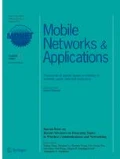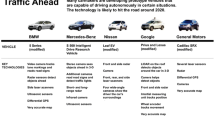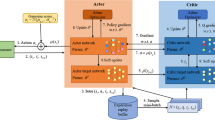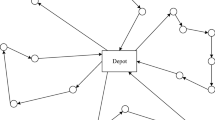Abstract
Internet of vehicles (IoV) is gradually combined with connected autonomous vehicles (CAV), which accelerates the development of CAV. In order to meet the service requirements of CAV, mobile edge computing (MEC) provides IoV with a novel paradigm which provides services by fast processing vehicle tasks at the road side units distributed near target vehicles. In this way, vehicle tasks can be offloaded to edge servers deployed in road side units (RSU). A vehicle tasks offloading problem requires load balance of edge servers to be maintained with minimum total time cost. Thus, we proposed a vehicle tasks offloading method (VTO) in which the vehicle tasks offloading problem is formulated as a multi-objective optimization problem. Hence, we design a multi-objective optimization evolutionary algorithm basing on improving the strength pare to evolutionary algorithm (SPEA2) and technique for order preference by similarity to ideal solution (TOPSIS) and multiple criteria decision making (MCDM). Through theoretical analysis and experimental evaluation, the results shows that the performance of VTO is effective and efficient.





Similar content being viewed by others
References
Arslan G, Marden JR, Shamma JS (2007) Autonomous vehicle-target assignment: A game-theoretical formulation. Dynamic Systems Measurement and Control
Parkinson S, Ward P, Wilson K, Miller J (2017) Cyber threats facing autonomous and connected vehicles: Future challenges. IEEE Trans Intl Transpor Sys 18(11):2898–2915
Gao H, Xu Y, Yin Y, Zhang W, Li R, Wang X (2019) Context-aware qos prediction with neural collaborative filtering for internet-of-things services. IEEE Internet of Things Journal
He Q, Cui G, Zhang X, Chen F, Deng S, Jin H, Yanhui Li, Yang Y (2020) A game-theoretical approach for user allocation in edge computing environment. IEEE Trans Parallel Dist Sys 31(3):515–529
Gao H, Liu C, Li Y, Yang X (2020) V2vr: Reliable hybrid-network-oriented v2v data transmission and routing considering rsus and connectivity probability. IEEE Transactions on Intelligent Transportation Systems
Wang C, Liang C, Yu FR, ChenQ, Tang L (2017) Computation offloading and resource allocation in wireless cellular networks with mobile edge computing. IEEE Trans Wirel Commun 16(8):4924–4938
Guo Y, Yang Q, Yu FR, Leung VCM (2018) Cache-enabled adaptive video streaming over vehicular networks: A dynamic approach. IEEE Trans Veh Technol 67(6):5445–5459
Zhang Y, Wang K, He Q, Chen F, Deng S, Zheng Z, Yang Y (2019) Covering-based web service quality prediction via neighborhood-aware matrix factorization. IEEE Trans Serv Comput
Ren J, Yu G, He Y, Li GY (2019) Collaborative cloud and edge computing for latency minimization. IEEE Trans Veh Technol 68(5):5031–5044
Li Y, Jin D, Hui P, Chen S (2016) Contact-aware data replication in roadside unit aided vehicular delay tolerant networks. IEEE Trans Mobile Comput 15(2):306–321
Trinh H, Calyam P, Chemodanov D, Yao S, Lei Q, Gao F, Palaniappan K (2018) Energy-aware mobile edge computing and routing for low-latency visual data processing. IEEE Trans Multimed 20 (10):2562–2577
Wang X, Yang LT, Song L, Wang H, Ren L, Deen J (2020) A tensor-based multi-attributes visual feature recognition method for industrial intelligence. IEEE Trans Industr Inform
Xu X, Zhang X, Liu X, Jiang J, Qi L, Bhuiyanm ZA (2020) Adaptive computation offloading with edge for 5g-envisioned internet of connected vehicles. IEEE Trans Intell Transp Sys
Zhang Y, Cui G, Deng S, Chen F, Wang Y, He Q (2018) Efficient query of quality correlation for service composition. IEEE Trans Serv Comput
Gao H, Duan Y, Shao L, Sun X (2019) Transformation-based processing of typed resources for multimedia sources in the iot environment. Wireless Networks: 1–17
Dinh TQ, La QD, Quek TQS, Hyundong Shin (2018) Learning for computation offloading in mobile edge computing. IEEE Trans Commun 66(12):6353–6367
Zhao H, Deng S, Zhang C, Du W, He Q, Yin J (2019) A mobility-aware cross-edge computation offloading framework for partitionable applications. 2019 IEEE International Conference on Web Services (ICWS), pp 193–200
Deng M, Tian H, Lyu X (2016) Adaptive sequential offloading game for multi-cell mobile edge computing. 2016 23rd International Conference on Telecommunications (ICT), pp 1–5
Bouet M, Conan V (2018) Mobile edge computing resources optimization: A geo-clustering approach. IEEE Trans Netw Service Manag 15(2):787–796
Zhang K, Mao Y, Leng S, Maharjan S, Vinel A, Zhang Y (2019) Contract-theoretic approach for delay constrained offloading in vehicular edge computing networks. Mobile Netw Appl 24(3):1003–1014
Yin H, Zhang X, Zhan T, Zhang Y, Min G, Wu DO (2013) Netclust: A framework for scalable and pareto-optimal media server placement. IEEE Trans Multim 15(8):2114–2124
Dai Y, Xu D, Maharjan S, Zhang Y (2018) Joint offloading and resource allocation in vehicular edge computing and networks. In: 2018 IEEE Global communications conference (GLOBECOM). IEEE, pp 1–7
Zhang Y, Yin C, Wu Q, He Q, Zhu H (2019) Location-aware deep collaborative filtering for service recommendation. IEEE Transactions on Systems, Man, and Cybernetics: Systems
Wang X, Yang LT, Wang Y, Ren L, Deen MJ (2020) Adtt: A highly-efficient distributed tensor-train decomposition method for iiot big data. IEEE Trans Industr Inform
Rodrigues TG, Suto K, Nishiyama H, Kato N (2017) A pso model with vm migration and transmission power control for low service delay in the multiple cloudlets ecc scenario. In: 2017 IEEE international conference on communications (ICC). IEEE , pp 1–6
Li L, Li Y, Hou R (2017) A novel mobile edge computing-based architecture for future cellular vehicular networks. In: 2017 IEEE wireless communications and networking conference (WCNC). IEEE, pp 1–6
Intharawijitr K, Iida K, Koga H, Yamaoka K (2017) Practical enhancement and evaluation of a low-latency network model using mobile edge computing. In: 2017 IEEE 41st annual computer software and applications conference (COMPSAC), vol 1. IEEE, pp 567–574
Yang T, Hu Y, Gursoy MC, Schmeink A, Mathar R (2018) Deep reinforcement learning based resource allocation in low latency edge computing networks. In: 2018 15th international symposium on wireless communication systems (ISWCS). IEEE , pp 1–5
Xu X, Shen B, Yin X, Khosravi MR, Wu H, Qi L, Wan S (2020) Edge server quantification and placement for offloading social media services in industrial cognitive iov. IEEE Trans Industr Inform
Zitzler E, Laumanns M, Thiele L (2001) Spea2: Improving the strength pareto evolutionary algorithm. TIK-report 103
Acknowledgements
This research is supported by the National Natural Science Foundation of China under grant No.61702277 and No. 61702442. This work is also supported by the Priority Academic Program Development of Jiangsu Higher Education Institutions (PAPD) fund, the Financial and Science Technology Plan Project of Xinjiang Production and Construction Corps, under grant No. 2017DB005 and No. 2020DB005 and the Application Basic Research Project in Yunnan Province Grant No. 2018FB105. In addition, this work is supported in part by the Postgraduate Research and Practice Innovation Program of Jiangsu Province under Grant KYCX21_1018.
Author information
Authors and Affiliations
Corresponding author
Additional information
Publisher’s Note
Springer Nature remains neutral with regard to jurisdictional claims in published maps and institutional affiliations.
Rights and permissions
About this article
Cite this article
Wu, Q., Xu, X., Zhao, Q. et al. Tasks Offloading for Connected Autonomous Vehicles in Edge Computing. Mobile Netw Appl 27, 2295–2304 (2022). https://doi.org/10.1007/s11036-021-01794-6
Accepted:
Published:
Issue Date:
DOI: https://doi.org/10.1007/s11036-021-01794-6




